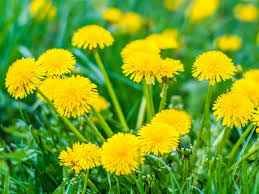Dandelions are going to bloom in the early spring, which is soon... They are a major Vitamin K source. I'm going to insert some quotes from a couple of websites here :
"The amount of vitamin K in dandelion is enough to exceed 5X the recommended daily limit.
"Vitamin K was identified by a Danish scientist in 1929 who named it koagulation, which is Danish for, of course, coagulation. Vitamin K isn't just one vitamin. It's composed of a pair of natural fat-soluble vitamins: Vitamin K1 (phylloquinone), and vitamin K2 (menaquinone).
"The function of vitamin K1 is primarily for the synthesis of a unique protein that has coagulation properties to control bleeding in your body.
"One of vitamin K2's most important functions is to regulate calcium. By promoting calcification in bones and teeth, vitamin K2 improves bone density. Vitamin K2 prevents calcium from being deposited in the kidneys and helps reduce the formation of kidney stones. Vitamin K2 also offers cardiovascular benefits by preventing calcification of your arteries, which helps reduce the risk of heart disease.
"Researchers suggested that vitamin K2 is extremely promising for the prevention of cancer without toxicity. One hospital in Canada suggested that dandelions might be useful due to the fact that it can help with programmed cell death. This means that it can kill cancer cells while leaving normal cells unharmed, unlike chemotherapy or radiotherapy."
"Toxicity can be caused by menadione, sometimes called vitamin K3, which is a synthetic, water-soluble vitamin K precursor that is used in supplements. Merck Manual notes that menadione should not be taken to treat vitamin K deficiency.
"Normally, vitamin K deficiency is uncommon in healthy adults because it is synthesized by bacteria in the intestine, stored in the liver and recycled as needed. Since vitamin K2 is involved in bone and heart health, signs of a deficiency often remain undetected until it's too late. The buildup of plaque in arteries and bone loss may take years to be detected.
"Don't take vitamin K with anticoagulants, such as warfarin (Coumadin). Vitamin K helps blood to clot — warfarin is used to slow blood clotting. The two substances have a major interaction.
"Too much vitamin K may lower blood sugar levels.
In addition to vitamin K, dandelion also contains magnesium, zinc, potassium, and vitamins A and C — all of which can keep your bones healthy. Magnesium has been recognized as a key ingredient for the absorption of calcium.
"Dandelions are also a natural laxative meaning that they won’t have any problem with cleaning out your colon and preventing diseases that may otherwise develop.
"Dandelion is a natural diuretic which means it can help you urinate more often. Avoid taking excessive Vitamin K if you have kidney disease.
"The sap of dandelion has been known to be an effective natural treatment against eczema. However, before you apply it topically you should proceed with caution since some people may have allergic reactions on their skin when using it depending on various genetic factors. The high alkaline content in dandelion milk can also serve as a natural pesticide, and a healthier alternative to other topical creams that are filled with hormones.
Source: https://veryhealthy.life/14-he....alth-benefits-of-dan
https://www.livestrong.com/art....icle/151110-vitamin-
